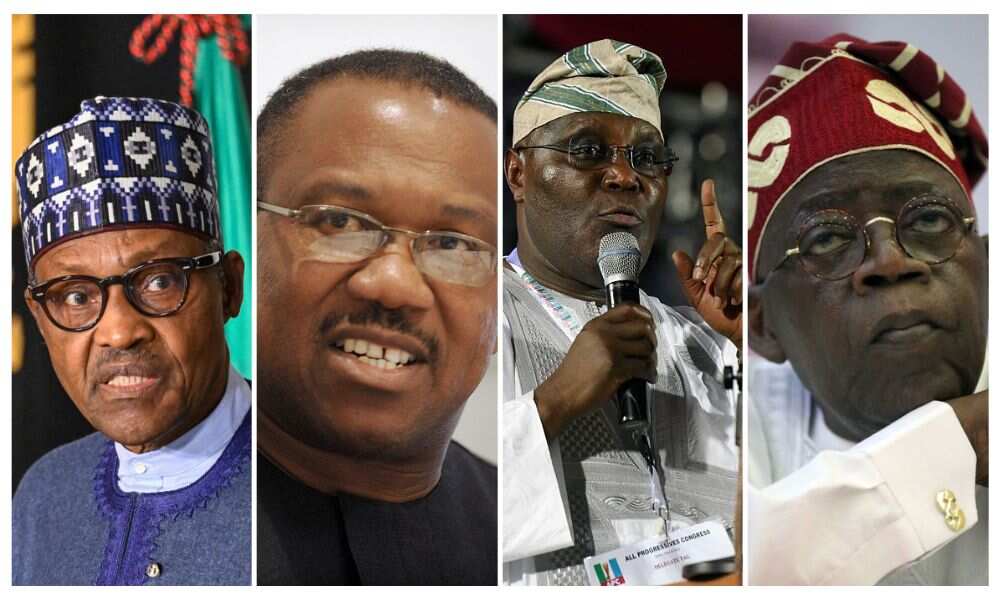Three Big Challenges Buhari's Successor Will Face in 2023
- The next president after Buhari will have a lot of economic decisions to make to steer the country in the right direction
- Inflation, debt profile and other sensitive issues are what the next president will have to contend with
- Also, insecurity remains one of the sore points in Nigeria's economy, which is essential in driving FDI
PAY ATTENTION: Click “See First” under the “Following” tab to see Legit.ng News on your Facebook News Feed!
With five months to the next presidential election, Nigerians are on edge over who will succeed the incumbent, President Muhammadu Buhari, whose two tenures elapses on May 29, 2023.
Buhari came to power promising Nigerians that he would fight corruption, revamp the economy and stop insecurity in the country.

Source: Getty Images
Experts score Buhari low
Analysts have scored the Daura-born general very low on the three-point plan, which saw Nigerians trooping out massively to vote for him in 2015 and 2019.

Read also
Atiku Abubarkar lists key economic agenda for his government if he Wins next year's election
PAY ATTENTION: Follow us on Instagram - get the most important news directly in your favourite app!
Under him, Nigeria's economic indices are not looking too good. Nigeria was named the poverty capital of the world by Brookings Institute, which said about 85 million Nigerians fell below the poverty line.
It means that Nigerians became poorer under Buhari as job losses and unemployment surged to about 33 per cent, according to various reports.
According to August figures released by the National Bureau of Statistics, inflation in Nigeria is at a 17-year high of 20.54 per cent.
It is believed that under Buhari, insecurity became monstrous and widespread. Banditry in the north and insurgency became an industry, and Nigerians became the third most terrorised country in the world, the terrorism index said.
Nigerians believe that Buhari paid lip service and scant attention to the fight against corruption. A former Accountant-General was said to have enriched himself to the tune of N80 billion and many other corruption cases under his administration.
It will be an arduous task for whoever succeeds President Buhari on May 2023.
Petrol subsidy removal
President Buhari has fixed June 2023 to remove the petrol subsidy, a subtle move many analysts say he made to avoid being caught up in the problems that may result from the removal.
Petrol subsidy is a sensitive issue in Nigeria.
Reuters reports that Nigeria could spend over N6 trillion next year if it keeps subsidising petrol.
In April this year, the National Assembly approved N4 trillion for a petrol subsidy for 2022.
Whoever takes over the reins of power will have to contend with the issue, as Nigerians are very sensitive to the topic.
Removing the petrol subsidy could have a ripple effect on the economy. This is because prices of goods and services always increase by as much as 100 per cent.
Adeola Oyeleke, an energy expert, said the next president would have to be careful in implementing petrol subsidy removal.
"It should be done in a rush. It should be phased and things put in place to cushion the effect. It's going to be really tough," he said.
Bloated debt profile
Nigeria is facing a massive debt crisis. As a result, the International Monetary Fund (IMF) and the World Bank are harping on Nigeria applying the breaks on borrowing.
Currently, the debt burden around the neck of the country stands at N45.6 trillion, which analysts say is becoming unserviceable.
The Nigerian government admitted recently that its revenue-to-debt service ratio is down, meaning the country is running a high budget deficit. As a result, it may default on its debt any time soon.
Critical infrastructure would need to be funded, hence the temptation to borrow more from a successive government.
Buhari's successor will have to decide if he will continue on the same trajectory or slow down and focus on saving costs.
Uchendu Anyanaele, an economist and banker, stated that the next president should halt borrowing, assess what has been done with previous borrowings and see if there is a need to continue.
"It will not make any sense to embark on any borrowing spree. Nigeria needs to sit down and assess its current debt profile," Anyanaele said.
Inflation and food crisis
Nigeria's inflation is at a 17-year high of 20.69 per cent and signifies severe economic issues.
It means the Central Bank of Nigeria will adjust its rates to keep up with the current inflationary pressure.
And along with fighting inflation is also stabilising the local currency, the naira has fallen to an all-time low.
It trades at N706 per dollar in the parallel market, and analysts believe it would be a hard nut to crack for Buhari's successor.
Nigerians have enormous hopes for whatever happens next year and want the next president to stem these issues.
What I’ll Do after winning 2023 presidential election, Peter Obi drops strong, powerful details
Legit.ng reported that the presidential candidate of the Labour Party (LP), Peter Obi has reiterated that he will reduce insecurity and poverty if he emerges the winner of the 2023 presidential election to rule Nigeria, Vanguard reports.
The former Anambra governor disclosed that he expects to accomplish this by using job creation and reformative investments as mechanisms.
He also said he will shift the nation’s economy from consumptive to productive mode.
Source: Legit.ng




